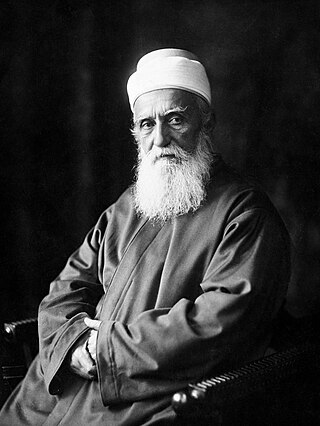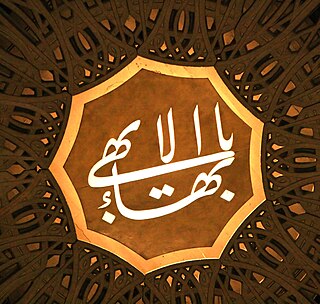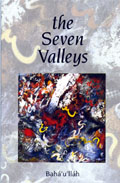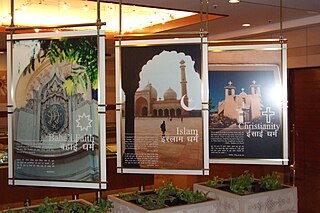
ʻAbdu'l-Bahá, born ʻAbbás, was the eldest son of Baháʼu'lláh and served as head of the Baháʼí Faith from 1892 until 1921. ʻAbdu'l-Bahá was later canonized as the last of three "central figures" of the religion, along with Baháʼu'lláh and the Báb, and his writings and authenticated talks are regarded as sources of Baháʼí sacred literature.

The Baháʼí Faith is a religion founded in the 19th century that teaches the essential worth of all religions and the unity of all people. Established by Baháʼu'lláh, it initially developed in Qajar Iran and parts of the Middle East, where it has faced ongoing persecution since its inception. The religion is estimated to have 5 to 8 million adherents, known as Baháʼís, spread throughout most of the world's countries and territories.
The Baháʼí administration is a system of elected and appointed institutions to govern the affairs of the Baháʼí community. Its supreme body is the Universal House of Justice, elected every five years.

In the Baháʼí Faith there are two covenants, deemed the 'greater' and 'lesser'. The greater covenant refers to an agreement of progressive revelation: that God will send messengers about every thousand years, and it is humanity's duty to recognize them and respond to their teachings. The lesser covenant is the agreement between the faith's founder, Baháʼu'lláh, and his followers, regarding the succession of leadership and the maintenance of unity.
Progressive revelation is a core teaching in the Baháʼí Faith that suggests that religious truth is revealed by God progressively and cyclically over time through a series of divine Messengers, and that the teachings are tailored to suit the needs of the time and place of their appearance. Thus, the Baháʼí teachings recognize the divine origin of several world religions as different stages in the history of one religion, while believing that the revelation of Baháʼu'lláh is the most recent, and therefore the most relevant to modern society.
The Manifestation of God is a concept in the Baháʼí Faith that refers to what are commonly called prophets. The Manifestations of God are appearances of the Divine Spirit or Holy Spirit in a series of personages, and as such, they perfectly reflect the attributes of the divine into the human world for the progress and advancement of human morals and civilization through the agency of that same Spirit.

There are several symbols used to express identification with the Baháʼí Faith: the nine-pointed star, a calligraphy known as the "Greatest Name", the Ringstone Symbol, or a five-pointed star.
The Baháʼí teachings represent a considerable number of theological, ethical, social, and spiritual ideas that were established in the Baháʼí Faith by Baháʼu'lláh, the founder of the religion, and clarified by its successive leaders: ʻAbdu'l-Bahá, Baháʼu'lláh's son, and Shoghi Effendi, ʻAbdu'l-Bahá's grandson. The teachings were written in various Baháʼí writings. The teachings of the Baháʼí Faith, combined with the authentic teachings of several past religions, are regarded by Baháʼís as revealed by God.

The Seven Valleys is a book written in Persian by Baháʼu'lláh, the founder of the Baháʼí Faith. The Seven Valleys follows the structure of the Persian poem The Conference of the Birds.
The Baháʼí Faith teaches that the world should adopt an international auxiliary language, which people would use in addition to their mother tongue. The aim of this teaching is to improve communication and foster unity among peoples and nations. The Baháʼí teachings state, however, that the international auxiliary language should not suppress existing natural languages, and that the concept of unity in diversity must be applied to preserve cultural distinctions. The Baha'i principle of an International Auxiliary Language (IAL) represents a paradigm for establishing peaceful and reciprocal relations between the world's primary speech communities – while shielding them from undue linguistic pressures from the dominant speech community/communities.
The theme of education in the Baháʼí Faith is given emphasis. Its literature gives a principle of universal and compulsory education, which is identified as one of key principles alongside monotheism and the unity of humanity.
Unity of humanity is one of the central teachings of the Baháʼí Faith. The Baháʼí teachings state that since all humans have been created in the image of God, God does not make any distinction between people regardless of race or colour. Thus, because all humans have been created equal, they all require equal opportunities and treatment. Thus the Baháʼí view promotes the unity of humanity, and that people's vision should be world-embracing and that people should love the whole world rather than just their nation. The teaching, however, does not equate unity with uniformity, but instead the Baháʼí writings advocate for the principle of unity in diversity where the variety in the human race is valued.
One of the fundamental teachings of the Baháʼí Faith is that men and women are equal and that equality of the sexes is a spiritual and moral standard essential for the unification of the planet and a prerequisite for peace. Baháʼí teachings stress the importance of implementing this principle in individual, family, and community life. Nevertheless, the Baháʼí notion of the full spiritual and social equality of the two sexes does not imply sameness, so that gender distinction and differentiation are observed in certain areas of life. Significantly, while women can and do serve in an extensive range of elected and appointed positions within the Baháʼí administration at both national and international levels, they are not permitted to serve as members of the Universal House of Justice, the supreme governing institution of the Baháʼí Faith.
The Bahá'í Faith teaches that there is a harmony or unity between science and religion, and that true science and true religion can never conflict. This principle is rooted in various statements in the Bahá'í scriptures. Some scholars have argued that ideas in the philosophy of science resonate with the Bahá'í approach. In addition, scholars have noted the Bahá'í view of interpreting religious scriptures symbolically rather than literally as conducive to harmony with scientific findings. The Bahá'í community and leadership have also applied their teachings on science and religion with the goal of the betterment of society, for instance by providing education and technology.

Unity of religion is a core teaching of the Baháʼí Faith which states that there is a fundamental unity in many of the world's religions. The principle states that the teachings of the major religions are part of a single plan directed from the same God. It is one of the core teachings of the Baháʼí Faith, alongside the unity of God, and the unity of humanity.
Baháʼí literature covers a variety of topics and forms, including scripture and inspiration, interpretation, history and biography, introduction and study materials, and apologia. Sometimes considerable overlap between these forms can be observed in a particular text.

Some Answered Questions is a compilation of table talks of ʻAbdu'l-Bahá that were collected by Laura Clifford Barney between 1904 and 1906 across several pilgrimages. The book was first published in English in 1908. ʻAbdu'l-Bahá was the son of Baháʼu'lláh, the founder of the Baháʼí Faith, and was appointed by him as his successor and interpreter of his words.
Naw-Rúz is the first day of the Baháʼí calendar year and one of eleven holy days for adherents of the Baháʼí Faith. It occurs on the vernal equinox, on or near March 21, which is also the traditional Persian New Year.

In Baháʼí cosmology reality is divided into three divisions. The first division is God, who is preexistent and on whom the rest of creation is contingent. The second division is God's Logos, the Primal Will, which is the realm of God's commands and grace. This realm pervades all created things. The Manifestations of God, Messengers from God, are appearances of the Logos in the physical world. The third division is Creation, which includes the physical world. Creation is not seen as confined to the material universe, and individual material objects, such as the Earth, are seen to come into being at particular moment and then subsequently break down into their constituent parts. Thus, the current universe is seen as a result of a long-lasting process, evolving to its current state. In the Baháʼí Faith, the whole universe is a sign of God and is dependent on him and humanity was created to know God and to serve his purpose.
Baháʼu'lláh, the prophet-founder of the Baháʼí Faith, called for global agreement on human rights protection nearly eighty years before the adoption of the Universal Declaration of Human Rights (UDHR) in 1948. He taught that "an equal standard of human rights must be recognized and adopted.” Baháʼu'lláh called for governments to protect the human rights of their populations and to ensure their welfare. To safeguard human rights, Bahá'u'lláh urged global leaders to establish a world commonwealth that would include a system of collective security to protect populations against tyranny and oppression.







